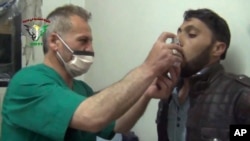In September 2013, after a sarin gas attack on the rebel-held Damascus suburb of Eastern Ghouta killed hundreds of people, the U.N. Security Council adopted a resolution demanding that Syria declare and dismantle its chemical weapons facilities and destroy its stockpiles.
Much of that work has been completed, but last month there were renewed allegations that the government of President Bashar al-Assad used barrel bombs filled with chlorine against the northwestern town of Sarmin in Idlib province. If true, that would violate a second council resolution, adopted just days before the attack, that condemned the use in Syria of any toxic chemical, including chlorine, and warned that a violation would have consequences.
Mohamed Tennari, a Syrian doctor who treated victims of the alleged chlorine attacks of March 16 and 23, on Thursday showed council ambassadors a video of doctors trying unsuccessfully to revive naked and lifeless babies and small children.
U.S. Ambassador Samantha Power told reporters the presentation moved the diplomats to tears.
Tennari also spoke to reporters about the attacks. “Everyone smelled a bleach-like odor in the atmosphere, and they heard the sound of helicopters hovering in the skies,” he said through an interpreter.
He said the helicopters released barrel bombs, but they did not explode. Shortly afterward, patients with respiratory symptoms started to arrive at the local field hospital.
“The patients we received in these attacks had symptoms of exposure to choking agents, so they had respiratory symptoms," Tennari said. "They did not have injuries related to bombs and bullets.”
Tennari said the medical staff also developed exposure symptoms from contact with their patients.
Medical personnel took samples of victims’ clothes and hair and samples from the soil in the affected areas and gave them to a British expert, who, Tennari said, confirmed it was chlorine.
Power, who arranged for Tennari and his colleague, Zaher Sahloul, to brief Security Council members, said it was incumbent upon the council to draw on the unity it has found on the issue of chemical weapons and stop these attacks from happening. She said accountability would come, even if it was slow.
“It is true we failed to secure an ICC [International Criminal Court] referral out of the Security Council, but it is not true that that means accountability will not happen in Syria," she said. "Individuals who are responsible for attacks like that will be held accountable."
The doctors and an activist who met with the council said they would like to see a no-fly zone established to protect civilians and help refugees return home.
But they stressed that as horrific as the chemical weapons attacks have been, the Syrian people are mainly suffering from the devastation of bombs and missiles and from imposed starvation in areas under siege by government and extremist forces.








